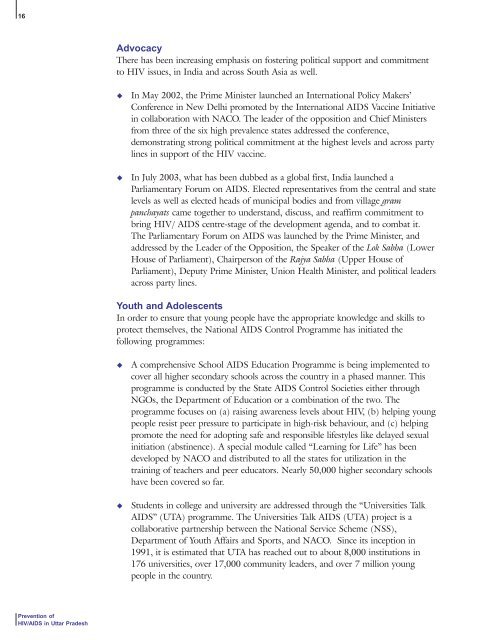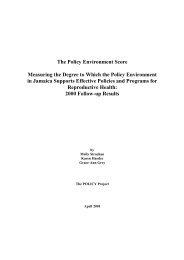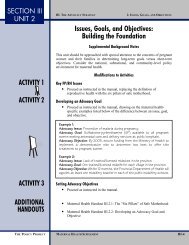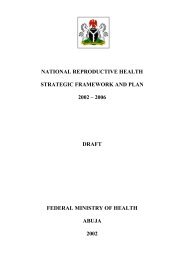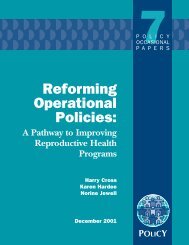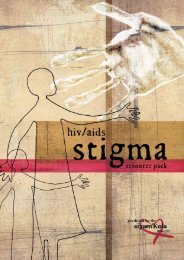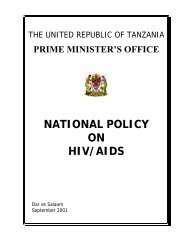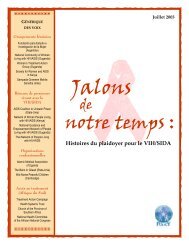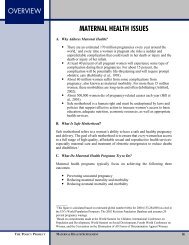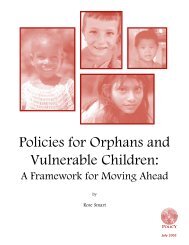- Page 2 and 3: Workshop Proceedings Prevention of
- Page 4 and 5: Session 5 Targeted Interventions in
- Page 6 and 7: PROJECT Preface Uttar Pradesh, the
- Page 8 and 9: GIPA GNP+ GOI GSA HLL ICMR IDU IEC
- Page 10: Glossary of Indian Terms Babus Boyf
- Page 13 and 14: 2 Prevention of HIV/AIDS in Uttar P
- Page 15 and 16: 4 prevalence is less than 10 percen
- Page 17 and 18: 6 HIV sentinel surveillance is carr
- Page 19 and 20: 8 Strategies for Prevention of HIV/
- Page 21 and 22: 10 and economically productive age
- Page 23 and 24: 12 approach the high-risk populatio
- Page 25: 14 A realization grew that existing
- Page 29 and 30: 18 NACO is positioning VCTCs as a o
- Page 31 and 32: 20 Already, 765 doctors and paramed
- Page 33 and 34: 22 discrimination and providing
- Page 35 and 36: 24 Bilateral Agencies Several bilat
- Page 37 and 38: 26 the small size of the sample sur
- Page 39 and 40: 28 Table 1 Migration Profiles of AI
- Page 41 and 42: 30 Conclusion Sentinel surveillance
- Page 43 and 44: 32 A project is seen as a solution
- Page 45 and 46: 34 Such information must be collect
- Page 47 and 48: 36 Figure 13 Figure 14 Solution Imp
- Page 50 and 51: Session 2 UPSACS, Multisectoral App
- Page 52 and 53: 41 Structure, Functions and Strateg
- Page 54 and 55: 43 High-risk groups need informatio
- Page 56 and 57: 45 Figure 2 Number of Interventions
- Page 58 and 59: 47 To motivate vulnerable groups o
- Page 60 and 61: 49 After the initial issue of a li
- Page 62 and 63: 51 Regularly supplying condoms C
- Page 64 and 65: 53 J.S. Deepak Multi-sectoral Invol
- Page 66 and 67: 55 most cases they have no other me
- Page 68 and 69: 57 When the epidemic first broke ou
- Page 70 and 71: 59 and so forth, as per need. Below
- Page 72 and 73: 61 Food and Civil Supplies Ration c
- Page 74 and 75: 63 Family Life Education Programme
- Page 76 and 77:
65 State Innovations in Family Plan
- Page 78 and 79:
67 Murali Dhar Vemuri Sanghita Bhat
- Page 80 and 81:
69 a higher percentage of migrants.
- Page 82 and 83:
71 Figure 2 Share of States by in a
- Page 84 and 85:
73 attract migrants from Uttar Prad
- Page 86 and 87:
75 Conclusion As mentioned, we do n
- Page 88 and 89:
77 Table 1 Percentage of Migrants t
- Page 90 and 91:
79 Table 4 Percentage of Migrants b
- Page 92 and 93:
81 Map 1 Top 5 districts gaining po
- Page 94 and 95:
83 Map 3 Urban Net Migrants in Utta
- Page 96 and 97:
85 Table 7 District-Wise Distributi
- Page 98 and 99:
87 Table 8 Ranking of Districts by
- Page 100 and 101:
89 Deoria 150 575 -425 Maharajganj
- Page 102 and 103:
91 Table 12 Percentage Distribution
- Page 104 and 105:
Session 3 Behavioural Surveillance
- Page 106 and 107:
95 Behavioural Dynamics of HIV/AIDS
- Page 108 and 109:
97 society and contribute to smooth
- Page 110 and 111:
99 Data and Methodology The basic d
- Page 112 and 113:
101 Table 4 shows the distribution
- Page 114 and 115:
103 consumed alcohol in their lives
- Page 116 and 117:
105 Table 1 Distribution and Mean A
- Page 118 and 119:
107 Table 3 Distribution of Husband
- Page 120 and 121:
109 Table 5 Distribution of Males w
- Page 122 and 123:
111 Table 7 Logistic Regression Ana
- Page 124 and 125:
113 The Balbir Pasha Story An Innov
- Page 126 and 127:
115 The project has documented nota
- Page 128 and 129:
117 engages in behaviour that may p
- Page 130 and 131:
119 “Balbir Pasha sometimes forge
- Page 132 and 133:
121 Hindu name, the campaign target
- Page 134 and 135:
123 tremendous shifts in risk perce
- Page 136 and 137:
125 executed fairly quietly, withou
- Page 138 and 139:
127 “Penury and the hope of a bet
- Page 140 and 141:
129 State. It is already being impl
- Page 142 and 143:
Session 4 Successful Interventions
- Page 144 and 145:
133 HIV/AIDS Prevention Programmes
- Page 146 and 147:
135 Capacity Building of NGO Partne
- Page 148 and 149:
137 STI health care providers to un
- Page 150 and 151:
139 Figure 8 Voluntary Condom Procu
- Page 152 and 153:
141 The frameworks of male-to-male
- Page 154 and 155:
143 polymorphous behaviours, and th
- Page 156 and 157:
145 Ongoing monitoring and evalu
- Page 158 and 159:
147 sexualities. In both countries,
- Page 160 and 161:
149 prevention and care programmes
- Page 162 and 163:
151 collection of how many condoms
- Page 164 and 165:
153 Annex 2 Examples of Outputs fro
- Page 166 and 167:
155 equally important from an HIV i
- Page 168 and 169:
157 than criminals, is of paramount
- Page 170 and 171:
Session 5 Targeted Interventions in
- Page 172 and 173:
161 Jyoti Mehra Targeted Interventi
- Page 174 and 175:
163 staff including project co-ordi
- Page 176 and 177:
165 Economic Vulnerability The very
- Page 178 and 179:
167 However, peer educators require
- Page 180 and 181:
169 Referrals SKS offers referral s
- Page 182 and 183:
171 The Prevention of Immoral Traff
- Page 184 and 185:
173 awareness about their legal rig
- Page 186 and 187:
175 enabling approaches that remove
- Page 188 and 189:
177 References 1. Family Health Int
- Page 190 and 191:
179 the UP State AIDS Central Socie
- Page 192 and 193:
181 Background of the Projects Like
- Page 194 and 195:
183 In order to reduce the incidenc
- Page 196 and 197:
185 treatment in the project, while
- Page 198 and 199:
187 Blood Banks and Safety Measures
- Page 200 and 201:
189 The motivation of donors is bei
- Page 202 and 203:
191 Clinicians should be sensiti
- Page 204 and 205:
193 regarding use, availability, an
- Page 206 and 207:
195 Most of the increase in statewi
- Page 208 and 209:
197 were aware that HIV could be tr
- Page 210 and 211:
199 50 years as a family planning m
- Page 212 and 213:
Session 6 GIPA and PLHA Network Cha
- Page 214 and 215:
203 Satheesh Chandran David Stephen
- Page 216 and 217:
205 Table 1 Overview Table: Percept
- Page 218 and 219:
207 Capacity building on organi
- Page 220 and 221:
209 As well as continued activism a
- Page 222 and 223:
211 programmes; and the barriers an
- Page 224 and 225:
213 involved in any of the programm
- Page 226 and 227:
215 Benefits of Involvement This se
- Page 228 and 229:
217 However, unlike the PLHAs, prog
- Page 230 and 231:
219 Programme mangers, however, fee
- Page 232 and 233:
221 value of the GIPA approach wher
- Page 234 and 235:
223 Annex GIPA Models Reproduced fr
- Page 236 and 237:
225 Networking for Change The India
- Page 238 and 239:
227 Gujarat, Karnataka, Kerala, Mah
- Page 240 and 241:
229 education centre, which provide
- Page 242 and 243:
231 the national network and the ce
- Page 244 and 245:
233 Africa, where the estimated num
- Page 246 and 247:
235 Developing IEC Materials IEC ma
- Page 248 and 249:
Session 7 VCTCs, Treatment, Care an
- Page 250 and 251:
239 Voluntary Counselling and Testi
- Page 252 and 253:
241 inform the person about the ava
- Page 254 and 255:
243 Voluntary Counselling and Testi
- Page 256 and 257:
245 Timings of VCTC The working hou
- Page 258 and 259:
247 As part of infection control me
- Page 260 and 261:
249 exposure to the field of HIV/AI
- Page 262 and 263:
251 Counselling, Consent, and Confi
- Page 264 and 265:
253 sent by courier, especially dur
- Page 266 and 267:
255 Availability of Condoms Condoms
- Page 268 and 269:
257 for outreach sessions, it can b
- Page 270 and 271:
259 Care and support for PLHAs, the
- Page 272 and 273:
261 infected, to the terminally ill
- Page 274 and 275:
263 and evaluation of care and supp
- Page 276 and 277:
265 enhanced STI treatment services
- Page 278 and 279:
267 continuing education will be ne
- Page 280 and 281:
269 to ensure a care continuum; and
- Page 282 and 283:
271 Printing of information, educat
- Page 284 and 285:
273 Possible Next Steps The steps c
- Page 286 and 287:
275 Group Discussion HIV/AIDS Preve
- Page 288 and 289:
277 HIV/AIDS Prevention Strategies
- Page 290 and 291:
279 viewed as small media- posters,
- Page 292 and 293:
281 manner appropriate to the needs
- Page 294 and 295:
283 Lack of conceptual clarity
- Page 296 and 297:
285 About Chairpersons, Discussants
- Page 298 and 299:
287 List of Participants Akash Gula
- Page 300 and 301:
289 Jyoti Mehra Programme Associate
- Page 302 and 303:
291 Rajesh Bangia Project Manager S
- Page 304:
POLICY is a five-year project funde


